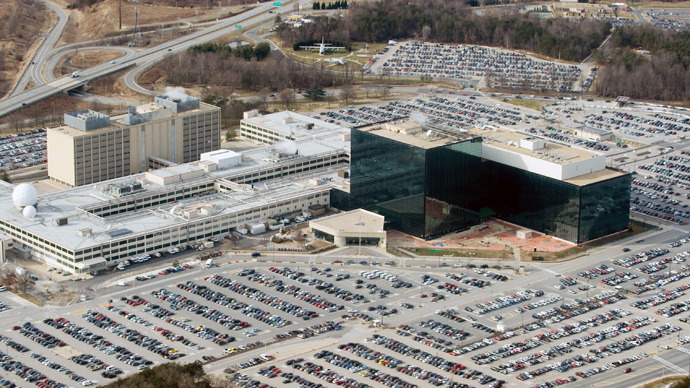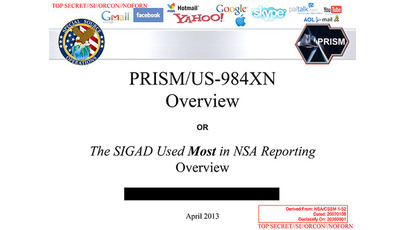Whistleblower hunt: NSA launches criminal inquiry into PRISM leak

The National Security Agency (NSA) has requested a criminal probe to track down those responsible for the leak of the PRISM global internet surveillance program.
The US American intelligence community is reeling over the revelation of the NSA’s massive Internet spy tool PRISM, the most high-profile public leak since WikiLeaks, and is taking action against those who publicized the top-secret program.
Washington has mounted a public defense of its right to monitor and record all personal information that passes through or is stored on the servers of nine leading tech companies through PRISM.
Shawn Turner, a spokesperson for the Office of the Director of National Intelligence, told the AP via email on Saturday that the NSA filed a criminal report with the Justice Department earlier this week over media leaks on PRISM.
US intelligence services are “doing an assessment of the damage that is being done to US national security by the revelation of this information, which is necessarily secret because the United States needs to be able to conduct intelligence activities without those methods being revealed to the world,” US Deputy National Security Adviser Ben Rhodes said.
The investigation, which is “in early stages”, would imply
close cooperation between the intelligence community and the
Justice Department, Rhodes explained. A joint team of
intelligence officers and government attorneys will evaluate the
potential damage caused by these “very disturbing leaks of
national security information.”

This follows President Barack Obama's public justification on Friday for the NSA’s extensive spying program. Obama declared the scheme helps to identify “folks who might engage in terrorism.”
“You can’t have 100 per cent security and also then have 100 per cent privacy and zero inconvenience,” Obama said.
Following Obama's statement, Director of National Intelligence James Clapper spoke out Saturday, calling the revelation of the previously top-secret program “reckless.” Clapper stressed that PRISM was authorized by Congress and has been strictly supervised by a secret Foreign Intelligence Surveillance Act Court to avoid the intentional targeting of American citizens.
He said that reports by The Guardian and The Washington Post
failed to put the program in context, stressing that PRISM is
overseen by a secret court under laws approved by the US
Congress.
PRISM is “one of our most important tools for the protection
of the nation’s security,” he insisted. “PRISM is not an
undisclosed collection or data mining program.”
“It is an internal government computer system to facilitate the government’s statutorily authorized collection of foreign intelligence information from electronic communication service providers under court supervision,” Clapper said without specifying, however, how non-Americans should regard being targeted by PRISM or similar programs created by the US.

Speaking in Palm Springs on Sunday, Deputy National Security Adviser Rhodes pointed out that Americans should understand that the US government “is not listening to anybody's phone calls” or “seeking to read people's electronic communications.” Only if PRISM detects a “nexus to terrorism” will they “pursue a warrant to try to investigate that lead, just as we would in any other intelligence or criminal procedure,” he said.
It remains unclear how the governmental accesses private data. Companies like Google and Facebook cooperating with PRISM vow that they never granted intelligence services “direct access” to their servers, though they may be making a semantic point.
Chris Soghoian, a tech expert and privacy researcher at the American Civil Liberties Union, explained to Foreign Policy that the "direct access" term “connotes a very specific form of access in the IT world: Unrestricted, unfettered access to information stored on servers.” For a system like PRISM, such access is not necessarily required. The same applies to the term “back door,” which describes a secret point of access to a system unknown to the owner.
Both Google and Facebook have not denied their participation in
PRISM, saying that they provided “user data to government only
in accordance with the law.”

The defense of PRISM by top US officials, including President Obama, strongly suggests that the surveillance program will remain in use.
The USA Patriot Act adopted by the George W. Bush administration has made global surveillance and tapping fully legal for US intelligence agencies. However, those who leaked the existence of PRISM may soon be treated similarly to US soldier Bradley Manning, accused of leaking diplomatic cables and the infamous 'Collateral Murder' video to WikiLeaks.
The prosecution for Manning's court martial are seeking life imprisonment on charges of "aiding the enemy," alleging that he intended to harm the US by leaking secrets to its enemies.














